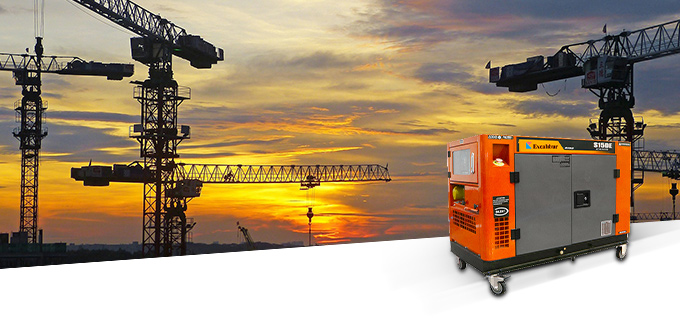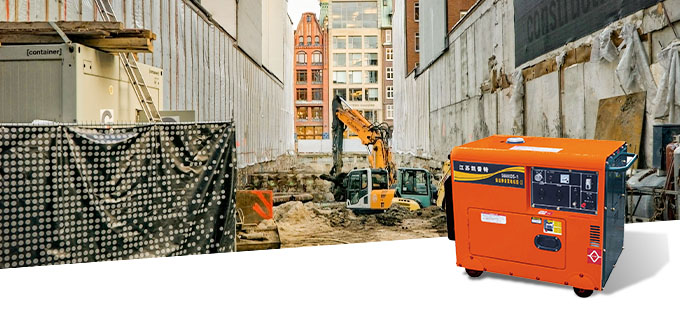Diesel generators, gasoline generators, and inverter generators are distinct types of power generators, each with its own set of characteristics, advantages, and applications. Understanding the differences among these generators is crucial for selecting the most suitable option based on specific needs and requirements.
Diesel Generators
1. Fuel Type
Diesel generators utilize diesel fuel for combustion. Diesel engines are known for their efficiency and durability.
2. Fuel Efficiency
Diesel generators are usually more fuel-efficient than gasoline generators. They provide longer runtimes per gallon of fuel, making them cost-effective for continuous or extended use.
3. Power Output and Durability
Diesel generators are well-suited for high-power output and heavy-duty applications. They are durable and often chosen for industrial, commercial, and backup power needs.
4. Longevity
Diesel engines tend to last longer than gasoline engines. Rugged construction and lower operating temperatures contribute to durability.
5. Fuel storage and safety
Diesel fuel has a longer shelf life than gasoline and is less volatile, making it safer to store. Diesel generators are often favored for standby and emergency power applications.
6. Initial Cost and Maintenance
Compared to gasoline generators, diesel generators generally have a higher upfront cost. However, they often require less frequent maintenance, leading to lower long-term operating costs.
Gasoline Generators
1. Fuel Type
Gasoline generators run on gasoline, which is more readily available than diesel fuel. Gasoline engines are commonly used in portable generators.
2. Portability
Gasoline generators are often more compact and lighter than diesel generators, making them highly portable. They are popular for outdoor activities, construction sites, and residential backup power.
3. Power Output and Usage
Gasoline generators are suitable for smaller power requirements. They are commonly used for camping, recreational activities, and as backup power for essential home appliances.
4. Fuel Availability and Shelf Life
Gasoline is widely available but has a shorter shelf life than diesel. Stabilizers may be required for long-term storage to prevent fuel degradation.
5. Starting and Warm-Up
Gasoline engines generally start more easily in cold weather compared to diesel engines. They also have a shorter warm-up time before reaching full power output.
6. Maintenance
Gasoline generators may require more frequent maintenance, especially if used infrequently. Stale fuel, carburetor issues, and spark plug maintenance are common considerations.
Inverter Generators
1. Technology
Inverter generators use advanced electronics to produce clean and stable power. They convert AC power to DC and then back to AC, ensuring a consistent and reliable output.
2. Fuel efficiency and variable speed
Inverter generators are very fuel-efficient as they adjust the engine speed to the electrical load. This feature contributes to lower fuel consumption and quieter operation.
3. Clean Power Output
Inverter generators produce clean and stable power with a low total harmonic distortion (THD), making them suitable for sensitive electronics such as laptops and smartphones.
4. Portability
Inverter generators are often compact and lightweight, enhancing their portability. They are popular for camping, outdoor events, and recreational activities.
5. Noise level
Inverter generators operate at a lower noise level than conventional generators. Inverter technology allows for quieter operation, making it suitable for quiet environments.
6. Cost
Compared with conventional generators, inverter generators generally have a higher upfront cost. However, their fuel efficiency and clean power output can contribute to long-term cost savings.
Choosing the right generator
Choosing the right generator depends on the specific needs and usage. For heavy-duty and industrial applications, where high power output and durability are crucial, diesel generators are often preferred. Gasoline generators are ideal for portable and intermittent use, while inverter generators cater to those who prioritize clean power, fuel efficiency, and low noise levels.
In summary, diesel generators, gasoline generators, and inverter generators serve diverse purposes and cater to different requirements. Careful consideration of factors such as power needs, portability, fuel availability, and cost will guide the selection process, ensuring that the chosen generator aligns with the intended application and provides reliable power when needed.




